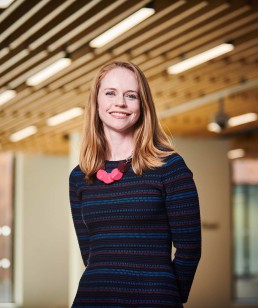Features | By Anthony Coleman
City pioneers new student employability programme
City has become one of the first UK universities to make professional experience and career-focused modules a mandatory part of every undergraduate course for new students.
It is a pioneering approach that aims to enhance students’ experience, develop their skills and increase their chances of securing rewarding careers.
Work placements and careers guidance have long been an important feature of university education, but City’s new Career Activation Programme takes student employability to a whole new level.
“Employability has always been part of our mantra and sits right at the heart of who we are as a university,” says Gemma Kenyon, Director of Careers and Employability. “But the Career Activation Programme is a real, tangible action that shows how much we value employability and want to support our students.

“We recognise that many of our students have complex lives. Some have caring responsibilities or part-time jobs, so find it more difficult to get experience opportunities outside of their studies. We also have a high proportion of students from disadvantaged backgrounds who perhaps do not have a network of people they know in professional occupations that they can call on to secure placements. By making experience and support an integral part of the curriculum, we are levelling the playing field.”
A choice of experience options
The programme falls into two areas. Firstly, every student starting this year will need to gain professional experience. That could be, for example, a year-long placement or working on a short-term industry project. Secondly, every course will include a core module where students can learn about different career options and gain the practical skills they need to secure employment.
Several City courses already offer a year-long placement in industry, but that experience is not available on every course and not every student necessarily wants to add a year to their studies. Similarly, not every organisation can offer such a long placement. So the University has teamed up with a wide range of employers, from global blue-chips to local SMEs, public sector bodies to charities and action groups, to provide a wider range of experience placements and projects.
“Most students will have a choice of formats,” explains Gemma. “Subjects offer diverse career options and we know one size doesn’t fit all, so the different options reflect that.”
Meaningful, relevant placements
Science and technology students, for instance, will get the chance to work on exciting industry projects, while Bayes Business School students can take part in micro-placements – four-week intensive summer projects working directly with employers. Others in the school can become mentors and coaches to local school children, sharpening those skills that will serve them in the corporate world. Elsewhere across the University, healthcare students will continue to take clinical placements, while sociology students can work in teams with local community action groups.
“Regardless of the type of experience a student chooses, we have worked closely with employers to ensure that all the projects and placements are meaningful, relevant and improve professional-level skills,” she adds. “Being in London helps, obviously, because we are in the heart of such a vibrant and economically diverse city. With so much on our doorstep, we have been able to attract a wide range of different employers.
“What we have said to them isn’t ‘How can you help our students?’, but rather ‘what can our students work on to help you?’ We want our students to be as valuable to the employer as the employer is to them.
“Organisations tell us that it is not enough to just have skills developed through study – they want to see the experience students gain from placements and industry projects. We also know that these opportunities can often lead directly to employment.”
Tailored careers support
Alongside professional experience, career-focused modules will help students explore the breadth of career options in their chosen field and the pathways that lead to them. These modules go beyond generic careers advice or CV writing and are individually tailored to subjects. Developed and delivered by the University’s careers consultants in collaboration with academics, the modules look at the skills employers want and will feature alumni and others from industry talking about their career journeys and offering advice.
Gemma says: “We believe that the Career Activation Programme is a truly distinctive offering in university education and we hope to see its success reflected in graduate outcome metrics, league tables and student satisfaction surveys.
“But more than anything, we hope it shows that we are ambitious for our students and that ultimately we’re doing everything we can to help them secure excellent jobs.”
If you think you or your business would benefit from offering student placements or projects – or you would be happy to talk to students about your career journey – please contact City’s Careers and Employability team at careers@city.ac.uk.